University of York honours 16 for their contribution to society
Posted on 11 July 2014
They are among 16 people to receive honorary doctorates at the University’s graduation ceremonies on 16, 17 and 18 July.
Every year, the University confers honorary degrees on people who have made a significant contribution to society. Honorary graduates are selected from nominations by members of the University and often have existing links with academic departments or are York alumni.
Mairi MacInnes
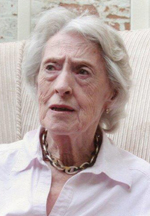
Mairi MacInnes
Mairi MacInnes is the distinguished author of seven books of poetry, two novels, and a memoir. She was born in 1925 in County Durham and educated in Yorkshire and at Somerville College, Oxford. In 1954 she married the American scholar and writer John McCormick and they went to live in West Berlin, where he taught at the Free University and where the first of her three children was born. From 1959 they lived chiefly in the USA, returning to Yorkshire in 1988. John McCormick died in 2010. Mairi MacInnes has given several readings in the Department of English and Related Literature from her books and reviews for publications such as The New Yorker, The Times Literary Supplement, The New Criterion, The Spectator and The Sewanee Review.
Professor Derek Pearsall
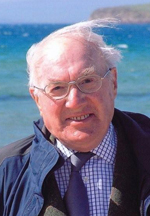
Professor Derek Pearsall
Derek Pearsall is an internationally recognised name in the field of Medieval English literature, whose 15 books on Chaucer and his contemporaries are landmark studies. Born and educated in Birmingham, Derek Pearsall was a lecturer at King’s College London from 1959 to 1965 before joining the Department of English at York. He rose from lecturer to professor before moving to Harvard University in 1985 to take up its prestigious Gurney Professorship of English Literature. On retirement in 2000, he returned to his home in York, where he has remained active as an Honorary Professor, attending events, assisting postgraduate students, and contributing to the intellectual life of both the Department and the Centre for Medieval Studies. He has served as President of the New Chaucer Society, President of the International Association of University Professors of English, and is a Fellow of both the American Academy of Arts and Sciences and Fellow of the Medieval Academy of America.
Professor Ahmed Zewail
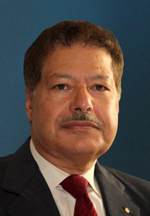
Professor Ahmed Zewail
Professor Ahmed Zewail is a Nobel Laureate and the Linus Pauling Chair Professor of Chemistry and Professor of Physics at the California Institute of Technology (Caltech). He is also the Director of the Moore Foundation’s Center for Physical Biology at Caltech. Born in Egypt, he is known internationally for his work in femtosecond science, pioneering ultrafast laser recording of the reactions of atoms as they occur in real time. More recently, he developed the field of 4D electron microscopy which enables imaging in both space and time. In 2009, President Obama appointed Professor Zewail to the Council of Advisors on Science and Technology, and he was named the First US Science Envoy to the Middle East. Professor Zewail’s other awards include the Albert Einstein World Award of Science and the Order of the Grand Collar of the Nile, Egypt’s highest state honour, The Zewail City of Science and Technology was established in Egypt in his name.
Zainab Salbi
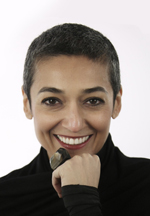
Zainab Salbi
Zainab Salbi is an Iraqi-American humanitarian, entrepreneur, author, filmmaker and media commentator who has dedicated herself to international women’s rights and freedom. At the age of 23, she founded Women for Women International – a grassroots humanitarian and development organisation dedicated to serving women survivors of wars, which, under 18 years of Zainab Salbi’s leadership, has helped more than 370,000 people in eight conflict areas, and raised more than 100 million dollars in aid and loans.
Zainab Salbi has been listed as one of the Top 100 Most Influential Women by Harper’s Bazaar, Newsweek, the Guardian, and Fast Company. She is the author of three books, including the national bestseller Between Two Worlds: Escape from Tyranny – Growing Up in the Shadow of Saddam. She is currently developing a production company which focuses on programmes for Arab and Muslim women and a documentary about the women involved in the Arab Revolutions.
Professor Padmanabhan Balaram
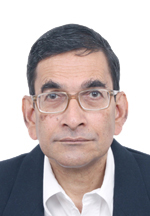
Professor Padmanabhan Balaram
Professor Padmanabhan Balaram is a Professor of Molecular Biophysics and the Director of the Indian Institute of Science, Bangalore. His main research interests are in bioorganic chemistry and molecular biophysics with an emphasis on protein design and engineering. He has investigated extensively the structure, conformation, and biological activity of synthetic and natural peptides, developing approaches for the design of protein mimics. He is a Fellow of the Indian Academy of Sciences, the Indian National Science Academy and the World Academy of Sciences, Trieste, Italy. Awards for his work include the Shanti Swarup Bhatnagar Prize of the Council of Scientific and Industrial Research (1986), and the national civilian awards Padma Shri (2002) and Padma Bhushan (2014) from the Government of India. Professor Balaram has served on many Government of India committees and is a member of both the Science Advisory Committee to the Union Cabinet and the Scientific Advisory Council to the Prime Minister. He was the Editor of Current Science between 1995 and 2013.
Hugh Masekela

Hugh Masekela
Hugh Masekela is a trumpeter, flugelhornist, singer and defiant political voice of international repute who remains deeply connected at home while his international career sparkles.
http://www.youtube.com/watch?v=sNv30-lwdec
Watch Hugh Masekela's performance at Thursday's graduation.
Hugh Masekela was born in Witbank, South Africa in 1939. He was given a trumpet at age 14 by Louis Armstrong and is still blowing strong at 75. He spent much of his life in exile during which time he released over 40 albums and was featured on countless more. He has been honoured in numerous ways such as receiving a Lifetime Achievement Award at WOMEX, being granted a Gold Medal of the Order of Ikhamanga in 2010 by the South African government and having 18 March proclaimed ‘Hugh Masekela Day’ in the US Virgin Islands.
His eclectic musical style is pervaded by jazz and mbaqanga combined with a gravelly voice, stirringly smooth horn sound and an ever-present concern for his home country and continent. He recently founded his own music label, House of Masekela, under which he released his latest album ‘Playing @ Work’.
Peter Murray
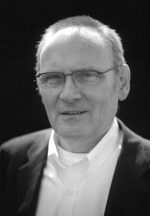
Peter Murray
Peter Murray CBE is the Executive Director of Yorkshire Sculpture Park (YSP) which he founded in 1977 while Principal Lecturer in Art Education at Bretton Hall College. YSP is now one of the world’s leading centres for sculpture, attracting over 350,000 visitors a year. Earlier this month, it was named UK Museum of the Year, winning the £100,000 Art Fund Prize.
From modest beginnings in 1977, YSP has grown under Peter Murray’s direction and vision into an international centre for modern and contemporary art, with award-winning indoor galleries set in 500 acres of 18th-century landscaped parkland. The collections include significant works by Henry Moore, Barbara Hepworth, Andy Goldsworthy, David Nash, Sir Anthony Caro and Antony Gormley, and site-specific works by Sol LeWitt and James Turrell.
He has curated numerous major exhibitions both at YSP, such as Joan Miró, and abroad, with highlights including Phillip King at Forte di Belvedere, Florence; British Contemporary Sculpture at Schloss Ambras and New British Art at Kunstraum, Innsbruck, Austria. He has lectured extensively and contributed to conferences internationally.
Professor Sir James Mirrlees
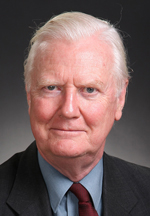
Professor Sir James Mirrlees
Awarded a Nobel Prize in 1996 for his fundamental contributions to the economic theory of incentives under asymmetric information, economist Professor Sir James Mirrlees laid the foundation for the modern analysis of complex information and incentive problems.
Born in Minnigaff, Scotland, he studied Mathematics at the University of Edinburgh and the University of Cambridge, where he completed a PhD in Economics. He was Edgeworth Professor of Economics and Fellow of Nuffield College, Oxford from 1968 to 1995 and after 1995, Professor of Political Economy at Cambridge. Since 2002 he has been Distinguished Professor-at-Large at the Chinese University of Hong Kong and in 2009 he became Master of Morningside College, established in the Chinese University of Hong Kong.
Sir James has also held Visiting Professorships at MIT, UC Berkeley and Yale. He was President of the Royal Economic Society from 1989 to 1992, and was knighted for contributions to economic science in 1997.
Professor Bertrand Meyer
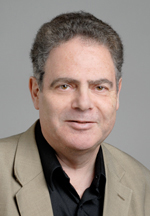
Professor Bertrand Meyer
Bertrand Meyer is an academic, author and consultant in software engineering. He created the Eiffel programming language and the concept of Design by Contract for building reliable software, and has played an important role in the advent of object-oriented programming.
His degrees are from École Polytechnique in Paris, Stanford (MS) and Université de Nancy (Dr Sc). He occupied positions in industry (EDF) and academia (University of California at Santa Barbara) before founding Eiffel Software in Santa Barbara. He was Adjunct Professor at Monash from 1998 to 2003. Since 2001, while remaining Chief Architect at Eiffel Software, he has been Professor of Software Engineering at ETH Zürich, conducting research on software verification, concurrent programming and programming languages.
He is a member of the French Academy of Technologies and has received several awards including IEEE’s Harlan Mills prize and ACM’s Software System Award. His books such as Object-Oriented Software Construction have become standard references in software engineering.
Gary Verity
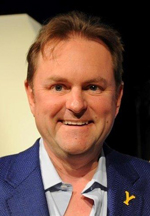
Gary Verity
Gary Verity has been Chief Executive of Welcome to Yorkshire since 2008 and is Chair of the Heritage Lottery Fund Yorkshire and Humber Committee. He has raised the profile of Yorkshire on a national and international level, playing the lead role in bringing the Tour de France to Yorkshire in 2014
A dynamic and motivational leader, he has international experience in brand building and managing complex businesses. His proven record of inspirational leadership ranges from entrepreneurial start-ups to large-scale transformations within FTSE100 companies. After 18 years with Royal Insurance, he built a reputation for turning around failing businesses. He turned four years of losses into profit at Bradford and Bingley’s retail property services arm.
A passionate Yorkshireman, in his spare time Gary Verity is an award-winning Dales sheep farmer and lives on a working farm near Leyburn. Since his late wife Helen was diagnosed with terminal cancer in 2004, he has raised more than £450,000 for cancer charities in Yorkshire.
Liz Wilson
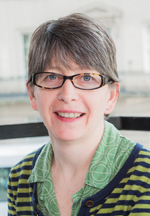
Liz Wilson
Liz Wilson has been an active member of the city’s cultural community since her appointment as Chief Executive of York Theatre Royal in December 2009. Before coming to York, she was Executive Director of the Oldham Coliseum. She has helped to promote an increased awareness of the city of York’s contemporary cultural strengths, programming a broad spectrum of plays, workshops and other activities to encourage a more diverse audience.
Under her leadership, York Theatre Royal is undergoing a £4 million refurbishment and it has one of the busiest Education and Community departments in the country. This includes a thriving youth theatre of over 300 young people and the nationally recognised ‘TakeOver’ Festivals as well as an artistic commissioning programme creating new theatre work for young performers. Liz Wilson was the driving force in developing and overseeing the critically acclaimed open air production of the York Mystery Plays which was a highlight of the York 800 celebrations.
Professor Paulo Gadelha
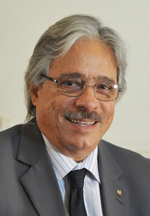
Professor Paulo Gadelha
Professor Paulo Gadelha has been elected President of Fiocruz, part of the Brazilian Federal Health Ministry, for a second term. His expertise includes clinical medicine, social medicine, health sciences and public health, as well as the history of medicine and medical anthropology.
Fiocruz plays a uniquely influential role in Brazilian and Latin American public health. While it has historically been the main producer of vaccines and pharmaceuticals, the organisation has enhanced its reach and internationalisation under Professor Gadelha’s presidency. It has developed a unique form of social medicine and public health, which is based on the building of community relationships and stake-holding. The success of these schemes has been widely accepted in Brazil, in Latin America and in institutions propagating global health policies.
Professor Gadelha studied medicine at Universidade do Estado do Rio de Janeiro and social medicine at Instituto de Medicina Social before receiving a doctorate from Escola Nacional de Saúde Pública in 1995.
Professor Anne Treisman
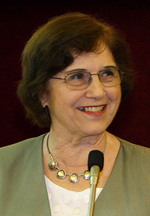
Professor Anne Treisman
Professor Anne Treisman, whose research is concerned with visual attention, object perception and memory, was the James S McDonnell Distinguished University Professor of Psychology, Princeton University until she retired in 2010. She was born in Wakefield, West Yorkshire in 1935 and obtained her BA from Cambridge and a DPhil from Oxford. She was a lecturer at Oxford and a Fellow of St Anne’s College, Oxford before taking up professorships at the University of British Columbia and University of California, Berkeley.
Professor Treisman has won international acclaim in recognition of the impact of her research within and beyond psychology. In 2013, President Obama awarded her the National Medal of Science, the USA’s highest honour for science. She is a Fellow of the Royal Society, a Fellow of the British Academy and a member of the US National Academy of Sciences. Among her awards is the Grawemeyer Award in Psychology and the Distinguished Scientific Contribution Award of the American Psychological Society.
Professor Mike Kelly
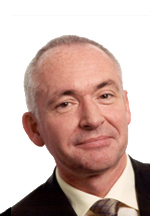
Professor Mike Kelly
Professor Mike Kelly has an international reputation as a leader in the field of evidence-based approaches to public health policy and practice.
He graduated in Social Science from the University of York in 1974. He gained an MPhil in Sociology at the University of Leicester and a PhD in Psychiatry at Dundee. He taught at the Universities of Leicester, Abertay, Dundee, Glasgow and Greenwich, where he was Head of School.
Professor Kelly was appointed Director of Evidence and Guidance at the Health Development Agency in the early 2000s and later Director of Public Health by the National Institute for Health and Care Excellence (NICE). In 2010 he was awarded the Alwyn Smith Prize of the Faculty of Public Health in recognition of his work on cardiovascular disease and alcohol misuse prevention. He is a Fellow of the Faculty of Public Health, an Honorary Fellow of the Royal College of Physicians and a Fellow of the Royal College of Physicians of Edinburgh.
Roland Keating
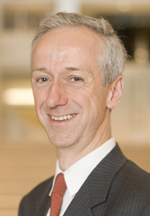
Roland Keating
Roland Keating is Chief Executive of the British Library. He took up his post in September 2012 after a long career with the BBC. Educated at Westminster School before reading Classics at Balliol College, Oxford, he joined the BBC in 1983. He was a producer and director for the Arts and Music department, making programmes for Omnibus, Bookmark and Arena. He was a producer and later became editor of The Late Show. In 1997, he became head of programming for UKTV, a multi-channel broadcaster partly owned by the BBC. In 1999, he became the BBC Controller of Digital Channels. In 2000, he also took on the responsibility of Controller of Arts Commissioning.
He became the Controller of the digital television station BBC Four in December 2001, masterminding its launch the following year. He became the channel controller for BBC Two in June 2004, a position he held until 2008. He was appointed temporary controller of BBC One in October 2007 and later Director of Archive Content.
Dr Susanna Moorehead
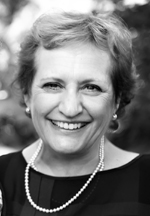
Dr Susanna Moorehead
Dr Susanna Moorehead has spent her career in international development. She worked for the Save the Children Fund in northern Mali, helping to rebuild people’s livelihoods after they had been destroyed by famine. She went on to be the Deputy Director of the Institute of Development Studies at the University of Sussex.
Dr Moorehead was the UK’s Executive Director at the World Bank from 2008 to 2012 and Head of the UK’s Department for International Development in India from 2005 to 2008. She is currently the Director for West and Southern Africa at the Department for International Development, which leads the UK Government’s work to end extreme poverty by creating jobs, unlocking the potential of girls and women, and helping to save lives when humanitarian emergencies strike. Dr Moorehead is a York alumna, achieving a BA in History and Politics in 1979. She then completed a Masters and PhD in International Relations at the London School of Economics.
Further information:
- Mairi MacInnes will be presented for her honorary degree by Professor Hugh Haughton, from the Department of English and Related Literature on 16 July in Ceremony One at 9.15am.
- Professor Derek Pearsall will bepresented for his honorary degree by Professor Linne Mooney, from the Centre for Medieval Studies on 16 July in Ceremony One at 9.15am.
- Professor Ahmed Zewail will bepresented for his honorary degree by Professor Ed Boyes, from the Department of Physics on 16 July in Ceremony Two at 11.45am.
- Zainab Salbi will be presented for her honorary degree by Dr Jane Grenville, Deputy Vice-Chancellor and Pro-Vice-Chancellor for Students on 16 July in Ceremony Three at 3pm.
- Professor Padmanabhan Balaram will be presented for his honorary degree by Professor Debbie Smith, Pro-Vice-Chancellor for Research on 16 July in Ceremony Four at 5.30pm.
- Peter Murray will be presented for his honorary degree by Dr Michael White, from the Department of History of Art on 17 July in Ceremony Five at 9.15am.
- Hugh Masekela will be presented for his honorary degree by Dr Jonathan Eato, from the Department of Music on 17 July in Ceremony Five at 9.15am.
- Professor Sir James Mirrlees will be presented for his honorary degree by Professor Jo Swaffield, from the Department of Economics on 17 July in Ceremony Six at 11.45am.
- Professor Bertrand Meyer will be presented for his honorary degree by Professor Richard Paige, from the Department of Computer Science on 17 July in Ceremony Seven at 3pm.
- Gary Verity will be presented for his honorary degree by Dr David Duncan, Registrar and Secretary on 18 July in Ceremony Eight at 9.15am.
- Liz Wilson will be presented for her honorary degree by Professor Judith Buchanan, from the Department of English and Related Literature on 18 July in Ceremony Eight at 9.15am.
- Professor Paulo Gadelha will be presented for his honorary degree by Professor Sanjoy Bhattacharya, from the Department of History on 18 July in Ceremony Nine at 11.45am.
- Professor Anne Treisman will be presented for her honorary degree by Professor Gary Green, from the Department of Psychology on 18 July in Ceremony Nine at 11.45am.
- Professor Mike Kelly will be presented for his honorary degree by Professor Hilary Graham, from the Department of Health Sciences on 18 July in Ceremony Ten at 3pm.
- Roland Keating will be presented for his honorary degree by Professor Brian Cummings, from the Department of English and Related Literature on 18 July in Ceremony Eleven at 5.30pm.
- Dr Susanna Moorehead will be presented for her honorary degree by Dr Claire Smith, from the Department of Politics on 18 July in Ceremony Eleven at 5.30pm.
Explore more news

Sodium channels in breast cancer cells a promising target for future treatments, study reveals
Thursday 25 July 2024

Cooling the classroom: University of York researchers to investigate UK schools’ responses to hot weather
Wednesday 24 July 2024

Hunter-gatherers kept an 'orderly home' in the earliest known British dwelling, study shows
Tuesday 23 July 2024

Study uses Game of Thrones to advance understanding of face blindness
Tuesday 23 July 2024

York academic contributes to new report on men’s health which reveals disparities between most and least deprived areas in the UK
Wednesday 17 July 2024
